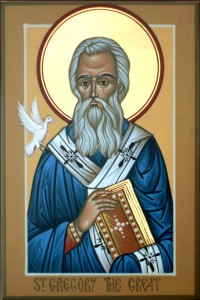 Saint Gregory the Great (540-604) is a Church father, founder of monasteries, and pastor of souls. The Church benefitted by Gregory’s vision of taking the Gospel to the margins. Gregory’s personal witness to the evangelical vows was demonstrated by his living as a simple monk who showed concern for those on the margins; he had a purity of heart in the midst of his new ministry’s numerous responsibilities as the Roman Pontiff. Pope Gregory set as his first priority the service of those who were considered the last in the diocese. Besides his significant contribution to the organization of sacred music Gregory is remembered for his writings, his commitment to the praying with Scripture in lectio divina and his love of Benedictine monasticism. What we know about Saint Benedict, for instance, comes from Saint Gregory.
Saint Gregory the Great (540-604) is a Church father, founder of monasteries, and pastor of souls. The Church benefitted by Gregory’s vision of taking the Gospel to the margins. Gregory’s personal witness to the evangelical vows was demonstrated by his living as a simple monk who showed concern for those on the margins; he had a purity of heart in the midst of his new ministry’s numerous responsibilities as the Roman Pontiff. Pope Gregory set as his first priority the service of those who were considered the last in the diocese. Besides his significant contribution to the organization of sacred music Gregory is remembered for his writings, his commitment to the praying with Scripture in lectio divina and his love of Benedictine monasticism. What we know about Saint Benedict, for instance, comes from Saint Gregory.
Benedetto Calati has this reflection on Gregory who is great:
The community of faith is a hermeneutic criterion of the Word of God. “Often, many things in holy Scripture that I was not able to understand on my own,” Gregory said courageously to his brothers, “I understood when I found myself among my brothers. After I realized this, I also tried to understand by whose merit such knowledge had been given to me.” What is even more surprising is that, for Gregory, every member of God’s people who obeys the Word is “an organ of truth” for his or her brothers and sisters in the faith. “When we who are filled with faith try to make God resound for others, we are organs of truth, and truth has the power to reveal itself to other people through me, or to reach me through other people.” Gregory’s humble discretion with regard to the action of the Spirit, and the Word whom he obeys, generates a model of Church leadership that is expressed in the formula, “Gregory, servant of the servants of God.”